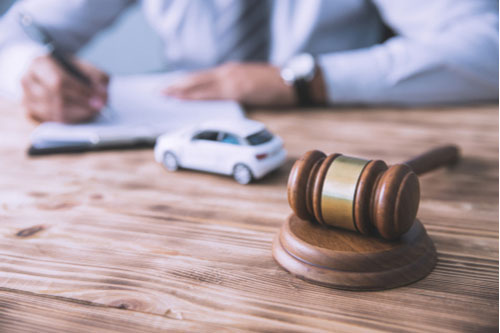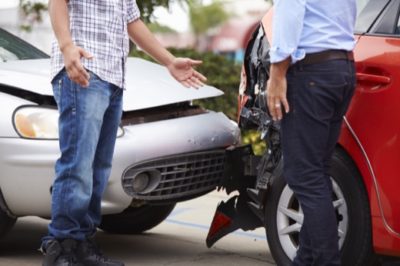Georgia has banned the use of handheld phones and devices while driving in an effort to curb distracted driving accidents. Under a law passed in 2018, drivers cannot touch or hold a phone or stand-alone electronic device. The use of headphones, headsets, or earpieces is also banned for phone calls.
Still, distracted driving accidents remain a problem on our state’s roads. If you or a loved one have been injured in such an incident, read on to understand how to build a strong case with the help of a Fayetteville distracted driving accident lawyer.
What Constitutes Distracted Driving?
Distracted driving encompasses a multitude of behaviors that divert a driver’s attention from the primary task of operating a vehicle. Visual distractions take your eyes off the road, manual distractions take your hands off the wheel, and cognitive distractions take your mind off driving.
Common culprits include cell phone use, texting, adjusting the radio, eating, or even engaging in conversations with passengers.
The statistics paint a grim picture. According to the National Highway Traffic Safety Administration (NHTSA), distracted driving claimed 3,522 lives in 2021 alone, translating to an average of nine deaths every day.
Georgia’s Laws Against Distracted Driving
Georgia strictly enforces laws against distracted driving to reduce accidents and injuries found in O.C.G.A. § 40-6-241. Police can pull over and issue citations to drivers using handheld devices while driving.
The penalties for distracted driving in Georgia vary based on the offense number. For a first offense, drivers face fines from $50 to $150 with no points added. Second and subsequent offenses within five years result in fines from $100 to $300 and three points added.
In addition to fines, distracted driving citations may require driver improvement or defensive driving courses. In serious or fatal distracted driving accidents, drivers can face reckless driving or vehicular homicide charges.
Exceptions to Distracted Driving Laws
As with any law, certain exceptions allow drivers to use their mobile devices while behind the wheel. These include utility workers and first responders, for example.
The first exception is for reporting emergencies like a car crash, medical emergency, fire, criminal activity, or hazardous road conditions. If you need to call 911 to get help in an urgent situation, the distracted driving law does not apply.
Proving Fault
If you’ve been involved in an accident caused by a distracted driver and you’re seeking compensation for your damages and injuries, you should know that an essential part of your claim is establishing causation.
This means that you have to be able to prove that the driver’s distracted behavior was the “but for” cause of the accident. In other words, would the accident have occurred but for the driver’s inattentiveness? This requires a thorough investigation of the circumstances surrounding the accident.
Police reports, witness testimonies, and data retrieved from the driver’s cell phone can offer vital clues. Analyzing call logs, text messages, and location data can paint a picture of the driver’s activity moments before the crash.
Also, the specific type of distraction plays an important role. More specifically, texting while driving significantly diminishes reaction time and situational awareness. Conversely, a quick glance at the radio might be deemed less impactful if it didn’t demonstrably impair the driver’s ability to respond to a sudden hazard.
How Can You Prove Negligence?
The victim must also prove that the driver acted negligently, meaning they breached their duty of care to operate the vehicle safely.
So if the the driver was texting behind the wheel, they automatically violated a safety statute, establishing a presumption of negligence. Your Fayetteville distracted driving crash attorney will then need to show that this violation directly caused the accident.
Even in the absence of a specific statutory violation, the common law principle of negligence prevails. The victim must demonstrate that the driver’s actions, such as eating while driving or adjusting the GPS with excessive distraction, fell below the standard expected of a careful driver and caused the accident.
Building Your Case
An experienced distracted driving accident lawyer can employ various strategies to gather evidence and build a compelling case. This may involve accident reconstruction experts analyzing skid marks and debris, forensic analysis of electronic devices, and expert witness testimony.
Your lawyer’s strategy when building your case may involve:
- Police report and accident reconstruction: Accident scene analysis, witness testimonies, and data from electronic devices like cell phones.
- Traffic camera footage: Visual confirmation of distracted driving behavior.
- Expert witness testimony: Testimony from accident reconstruction experts and forensic cell phone analysts
- Medical records and documentation: Documents proving the extent of your injuries and how they impacted your life
Contact a Fayetteville Distracted Driving Lawyer Today
If you or a loved one was hurt by a distracted driver, our Fayetteville distracted driving accident attorneys at Wade Law can help you build a strong case and receive compensation for your injuries and economic damages.
Call us at 770-282-1188 for a free case evaluation. The sooner you contact us, the sooner we can start preparing your case.










